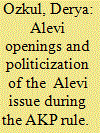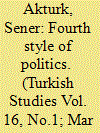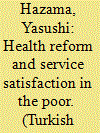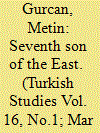|
|
|
Sort Order |
|
|
|
Items / Page
|
|
|
|
|
|
|
| Srl | Item |
| 1 |
ID:
137427


|
|
|
|
|
| Summary/Abstract |
This article reviews recent government efforts to address the “Alevi issue” and identify their successes and failures. It demonstrates that the “Alevi openings” constituted paradoxical processes: tracing various components of the “openings” through news media, it shows that, on one hand, they enabled the “Alevi issue” to be brought to public attention. On the other hand, once Alevis were made more visible in public, non-sympathizers could mobilize their representation for their own ends. These empirical findings have profound theoretical implications. They show that “discursive claims of democratization” at the state level do not necessarily result in democratic mechanisms, which can resolve the demands of a pluralistic civil society. The author argues that what she calls the “tutelary secularism” in Turkey, in other words, the management and disciplining of religious groups, continues under the Justice and Development Party (AKP) rule. This model not only fails, but also produces new sources of conflict in Turkey.
|
|
|
|
|
|
|
|
|
|
|
|
|
|
|
|
| 2 |
ID:
137424


|
|
|
|
|
| Summary/Abstract |
This paper examines the attempt by the Turkish underground journal Şizofrengi (1992–98) to provide a space for psychiatrists, artists, and mental patients to voice their personal concerns as a means to critique problems in Turkish society. Şizofrengi was founded by young psychiatrists in order to critique the problems they felt were endemic to their field. Rejecting the institutional practices and assumptions the editors found constraining in their psychiatric community, Şizofrengi sought to give the patient a space to speak for themselves in order to deconstruct the vaunted role of the psychiatrist in Turkey. But Şizofrengi also sought to appropriate the language of psychology and the “madnesses” of the patients it strives to cure in order to revitalize what the editors felt was a moribund literary culture. The journal gave a voice to marginalized, underground writers, critics, and film makers that would go on to become far better known outside the confines of the journals’ pages. While the result demonstrates that care must be taken when borrowing the discourse of the mentally ill, Şizofrengi presents an interesting case of a journal that was able to draw on issues of psychiatry in order to critique both literary and mainstream society.
|
|
|
|
|
|
|
|
|
|
|
|
|
|
|
|
| 3 |
ID:
137426


|
|
|
|
|
| Summary/Abstract |
This article discusses the political origins, present-day significance, and implications of the intellectual movement known as “Eurasianism” in Turkey, a movement with Euroskeptic, anti-American, Russophile, neo-nationalist, secularist, and authoritarian tendencies, and including among its ranks socialists, nationalists, Kemalists, and Maoists. Since the turn of the twenty-first century, Eurasianism emerged as a major intellectual movement in Turkey, competing against Pan-Islamism, Pan-Turkism, and Westernism. Aspiration for a pro-Russian orientation in foreign policy, and a socialist–nationalist, Left-Kemalist government at home are the international and domestic faces of Turkish Eurasianism, which distinguish this movement from others. These orientations and their origins are situated within the history of intellectual movements in Turkey, going back to the Kadro and Yön movements in the 1930s and the 1960s, respectively. Similarities and actual links between Russian and Turkish Eurasianism are also discussed.
|
|
|
|
|
|
|
|
|
|
|
|
|
|
|
|
| 4 |
ID:
137425


|
|
|
|
|
| Summary/Abstract |
Turkey began to reform its healthcare system in 2003 and introduced universal health insurance in 2008. This paper tests the effect of health reform in Turkey on satisfaction in the poor with public health services. An ordered logit model is applied to a pooled data set compiled from the Life Satisfaction Survey (N = 60,281) by the Turkish Statistical Institute during the period from 2003 to 2011. The results reveal that at the outset, the lowest 30 percent income group was less satisfied than the highest 70 percent income group, but this satisfaction gap dissipated after 2004 and never reappeared even during the post-reform period (2009–11).
|
|
|
|
|
|
|
|
|
|
|
|
|
|
|
|
| 5 |
ID:
137428


|
|
|
|
|
| Summary/Abstract |
This study offers the first systematic analysis of party splits in Turkish electoral politics. It first explores party splits from major parties since the late 1940s before focusing on splits from three Turkish centre-right parties in the 1950s, 1960s, and 1990s. This article finds no detectable patterns between the entry costs measured by disproportionality, and the occurrence of party splits in Turkey. Instead, it argues that perceived demand for new parties and internal party dynamics, namely changes in party ideology and leadership consolidation, push the dissident factions out of the party and have a decisive influence over their decision to establish a new party. The article concludes with a note on the implications of this finding for contemporary Turkish party politics.
|
|
|
|
|
|
|
|
|
|
|
|
|
|
|
|
| 6 |
ID:
137422


|
|
|
|
|
| Summary/Abstract |
Although Sezai Karakoç has been a prominent figure in the Turkish intellectual life for almost five decades, nothing scholarly has appeared so far to introduce him to the Western academia. Aside from his being considered to be one of the greatest Turkish poets in the twentieth century, for many, he is also an influential intellectual who has put his mark on Turkish Islamism and affected the Islamic community as deep as Mehmet Akif Ersoy and Necip Fazıl Kısakürek. Mainly because of his deliberate choice of being low profile and his distanced attitude towards media, he is not a widely known figure in the popular political arena. His ideas, however, have influenced many politicians in the contemporary Turkish Politics, particularly the elite cadres of currently running the Justice and Development Party (JDP). It is appealing to notice that a great number of policies he formulated in 1980s and 1990s have been developed and implemented by the JDP government. To elucidate Sezai Karakoç's intellectual depth and cultural vision, this study, first, introduces him, then opens up his conceptualization of civilization the grasp of which seems to constitute a fertile ground for the JDP's political rhetoric both for domestic and regional audiences, and lastly reveals his “doctrine of revival.”
|
|
|
|
|
|
|
|
|
|
|
|
|
|
|
|
| 7 |
ID:
137429


|
|
|
|
|
| Summary/Abstract |
Parallel to two intertwined processes of the politicization of ethnicity, religion and sexuality on the one hand, and the rise of the internet, on the other hand, hate speech has become one of the most topical issues of political debates. Academic interest on this topic has so far focused largely on the questions of (im)possibility of defining hate speech, on the hate speech/free speech dichotomy, and, thus on the possible ways of dealing with this big challenge of our times. This study tries to open a new window by resorting to the concept of human security. It argues that rival understandings of security (traditional or critical) lead to differences in perceptions of threats/harms which in turn lead to different conceptions of hate speech. This argument is illustrated through an analysis of the way the Kurdish issue in Turkey has been tackled in Ekşi Sözlük, one of the most popular web sites in the country.
|
|
|
|
|
|
|
|
|
|
|
|
|
|
|
|
|
|
|
|
|